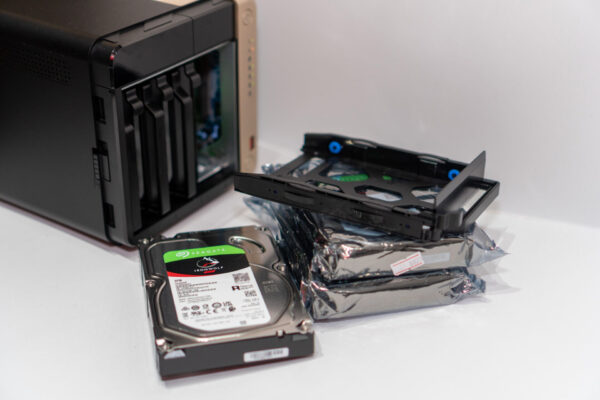
The QNAP TS-464 NAS, not unlike many from other brands, are often sold disk-less, meaning that they come without any storage, or in a bundle that includes some the storage disks. The former gives users the option to reuse their existing drives, or to get their preferred drives on their own.
QNAP arranged for Seagate to provide Seagate IronWolf NAS drives for my TS-464 NAS review. I’ve used IronWolf drives for a long time in my other projects, including my FreeNAS PC build, so it is not like this would be an unusual choice for me to test the TS-464 NAS with.
For those who are new to NAS, do understand that there can be vast differences between various types of hard disk drives. I’m not even talking about enterprise vs consumer disks, but just amongst hard disk drives targeted at home and consumer use. Some drives are designed for NAS operation, with key differentiation characteristics such as suitability for 24×7 continuous operations and better reliability.
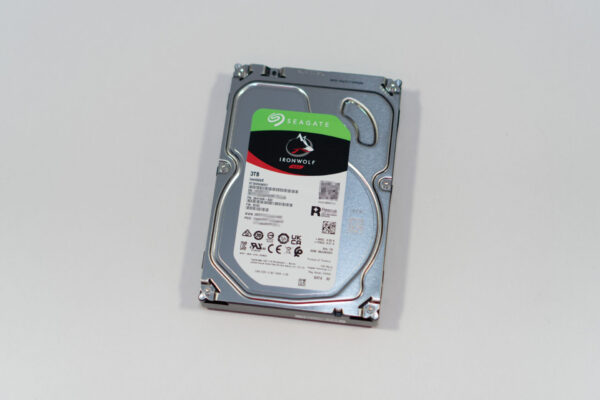
Some highlights of Seagate IronWolf NAS drives are:
- Designed for 24×7 usage
- Perfect for home, SOHO, and small business NAS use
- Available in capacities up to 18 TB and support up to 8 bays
- Comes with 3 years warranty and 3 years of data recovery services.
- Features IronWolf Health Management that helps protect data with prevention, intervention, and recovery recommendations
Basically, these hard disk drives are great for use in a 24×7 NAS.
I mentioned briefly in my TS-464 NAS review that I eked out pretty good performance in my test setup. Let me go into a little more details here.
My baseline configuration is something that is practical and one that I will actually use in production (i.e. for my real data, not just to test and play around). For me, this means I must have disk redundancy with RAID, and I must have data encryption. The 2nd part, to be clear, means that everything written to disk must be encrypted, so that my data remains safe even if the whole NAS or the individual disks are physically stolen.
In the QNAP NAS, this baseline configuration means:
- Storage pool using RAID1 with 2 disks (also tested 3 disks)
- A thick volume with volume-level encryption in the storage pool
- Shared folder created in the thick volume, accessible via SMB (Windows file sharing protocol)
To test, I ran CrystalDiskMark benchmark on my desktop PC which has a 1 GbE connection to a GbE switch connected to the TS-464 NAS.
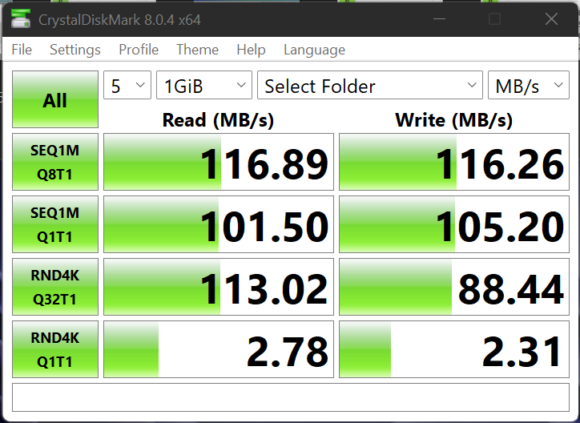
CrystalDiskMark reported 116 MB/s on both reads and writes. This works out to about 929 Mbps, which is pretty much pushing the limits of Gigabit Ethernet.
I don’t get any better performance with encryption turned off. I ran a test using a plain unencrypted volume, and still get the same 116 MB/s reads and writes.
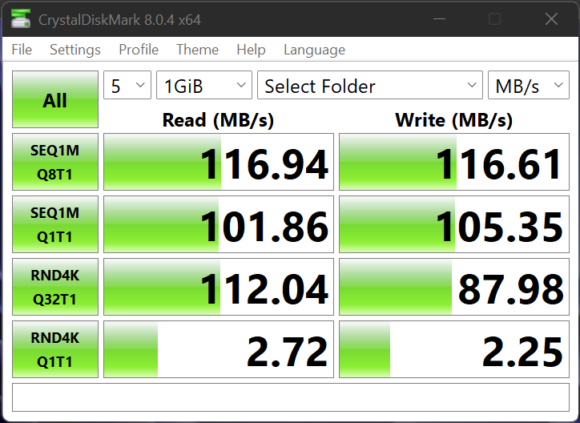
RAID1 means data needs to be duplicated in the NAS since parity data needs to be written to an extra disk. Although I do not recommend using RAID0, it can be desirable when performance is most critical. (Then, of course, perhaps one should use a SATA SSD for that.)
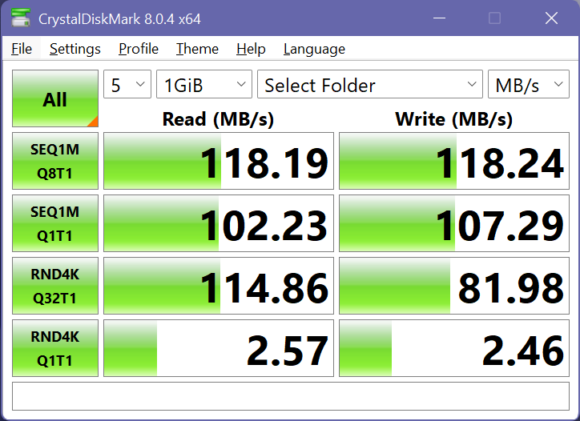
For this particular test, which I repeated several times, I usually get the same 116 MB/s reads and writes, but there is one best case of 118 MB/s reads and writes. I’m not sure if I repeat the RAID1 tests above enough times, one/some of them might also report 118 MB/s. I’m inclined to conclude that the RAID0 is not significantly different from RAID1 in my test conditions.
These results don’t necessarily mean that RAID1 is not worse, or that encryption has no impact. What it says is that the TS-464 NAS is likely bottlenecked by the GbE network in my test setup. So to be clear, the takeaway from these tests should be that, given a GbE network, RAID1 with encryption will not penalise performance.
During these tests, there are no background tasks running in the NAS, including no replication jobs, backup jobs, and no virtual machines running.
At a later time, I plan to share more test data under various usage conditions.
I mentioned IronWolf Health Management (or IHM) above, and if you’re like me, you might wonder what it is and how is it different from SMART. In a nutshell, IHM is like a smarter SMART. It is supported only on IronWolf and IronWolf Pro hard disk drives (excluding those under 4 TB capacities).
A little confusingly, specific IHM feature support varies according to the NAS OS. This is a (perhaps incomplete) list of IHM features:
- Schedule and review disk tests
- Monitor workload with charting to see data traffic
- Status information and suggested action for various problems (e.g. excessive vibration detected and what to do with it)
IHM monitors far more data points than SMART to decide how a drive’s health may be impacted. It can maintain a moving window of statistical data to perform trend analysis.
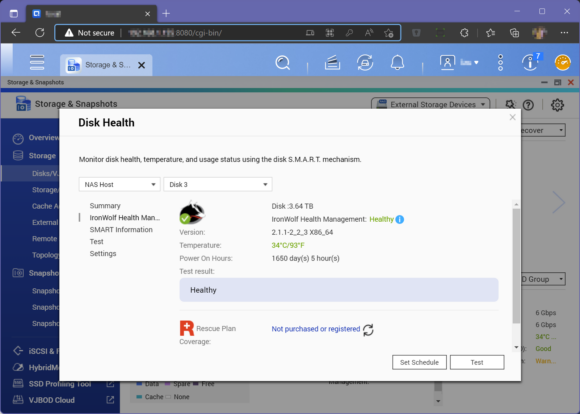
I pulled an existing 6 TB IronWolf drive from another NAS to test on the TS-464, and I can see that the IHM status shows as “Healthy”. Interestingly, this disk has a SMART warning. This could mean that the IHM assessment is that the drive is still overall healthy, even though SMART statistical data is showing some issues that have breached a predefined threshold.
Seagate IronWolf drives are available in capacities ranging from 1 TB to 18 TB. You can buy them from the official Seagate Shopee online store.
Update: I managed to run some 2.5GbE tests and the results are pretty interesting. I’ll share these findings in a later post. Watch this blog for updates!
View Comment Policy